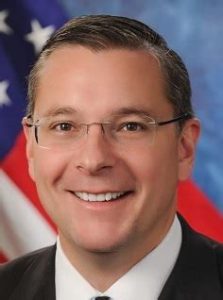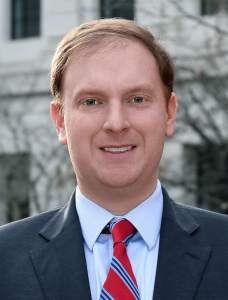Along with investigators, Unit uses Artificial Intelligence platform to analyze P-card transactions by public employees
By Matt Young
WV Press Association
CHARLESTON, W.Va. — “I’ve been an investigator and a prosecutor for three-decades now, and I couldn’t make heads or tails of what the reports were trying to say. It was like having an accountant trying to explain a crime.”
That’s what Steve Connolly, director of the Public Integrity & Fraud Unit at the W.Va. State Auditor’s office, said in a recent interview regarding his reaction after initially joining the unit. In addition to his duties as director, Connolly serves as general counsel and deputy to current State Auditor John B. “JB” McCuskey. Connolly has held these positions since Jan. 2019.
Created in late 2018 as a division within the Office of the State Auditor, the Public Integrity & Fraud Unit is tasked with investigating the theft, misuse, and mismanagement of public monies.
Prior to the Auditor becoming “Chief Inspector” for all public offices in 1998, that responsibility rested with West Virginia’s State Tax Commissioner. As Chief Inspector, the State Auditor may demand records from any local government entity, depose public officials, and initiate prosecutions. In 2010, then State Auditor Glen Gainer created three positions with the sole purpose of pursuing fraud-related investigations. In doing so, Gainer laid the groundwork for what was to become the Public Integrity & Fraud Unit.
“When Auditor McCuskey came in, he hired Marty Wright to head the unit,” Connolly said. “The very first case – right out of the gate – was Richwood.”
Connolly was referring to the investigation which culminated in the Auditor’s March 29, 2019, report. The report alleged “Mismanagement of City Finance and Abdication of Fiscal Responsibility,” as well as “Potential misuse of FEMA monies” on the part of Richwood city officials following the 2016 flood.
“We threw a lot of resources at it and hired more people,” Connolly continued. “At that time, I was still with the Secretary of State’s office. Marty recruited me to come over. He said, ‘We need a prosecutor. We need somebody who can walk into any court in the state and be able to handle these cases.’”
According to a summary of the Richwood investigation prepared by McCuskey’s office, “What started as an investigation by the West Virginia State Auditor into an alleged misuse of a purchasing card grew into an 18-month multi-faceted examination of the City of Richwood’s finances.”
The investigation led to the conviction of Richwood’s former mayor, Bob Henry Baber, for “obtaining money under false pretenses.” Marty Wright has since accepted a position with the West Virginia Health Care Association, with Connolly succeeding him as director of the Public Integrity & Fraud Unit.
“I’ve directly prosecuted, or assisted in the prosecution of, 40 convictions in three-and-a-half years,” Connolly noted. “I think there were five or six in federal court, and the remainder were in courts around the state. At last count, there have been criminal convictions in 16 counties (in West Virginia), and five federal cases.”
Currently, the Public Integrity & Fraud Unit employs two human monitors to review purchasing-card (P card) transactions made by public employees authorized to spend state funds. However, the unit also utilizes DataRobot – an Artificial Intelligence (AI) platform – to analyze such transactions.
“Rather than having eyeballs look at 50,000 credit card transactions a day, the computer can comb through it and give risk-scores for suspicious activities,” Connolly said, before further explaining how reports of “state level” suspicious activity are forwarded to the Legislative Commission on Special Investigations (CSI).
“We have a great relationship with CSI,” Connolly noted.“They’re basically the legislative-version of what I do on our side. We do local government, and CSI does state government.”
In addition to CSI, Connolly credited partnerships with numerous federal, state and local agencies for contributing to the unit’s success thus far. However, for all of the reported cases of potential fraud the unit investigates, Connolly shared that as much as 60% of them are unfounded. As for the cases that are legitimate, according to Connolly, most are acts of necessity or opportunity.
In 2021, Auditor McCuskey issued an OP-ED addressing fraud by public officials in West Virginia. Here is a portion:
“According to the Association of Certified Fraud Examiners, 5% of all funds distributed from state or federal programs will eventually go toward fraudulent activities. These payments will be dispersed through a variety of methods including kickbacks from vendors, delayed payments, stringing contracts, ghost employees and vendors, no bid contracts, nepotism and whatever a thief can concoct. In my opinion, none of that is acceptable—not even 5%. A grand scheme or misusing the state P-Card, a crime is being committed and you will be caught.
Presently, the Public Integrity and Fraud Unit of the State Auditor’s Office has 41 active fraud cases and potentially a dozen more ongoing. This year alone, our case work resulted in seven felony charge convictions. Restitution to the state for misspent funds has already grown to $556,000. These are tax dollars that were spent fraudulently. This was your money. Our team includes four investigators, seven forensic accountants, and two fraud monitors who look for illegal P-Card purchases. We work with the Southern and Northern District federal prosecutors, plus we have special prosecutorial privileges in five counties.
The formula for fraud is motivation, such as addiction, or past due bills; rationalization, which is the feeling you are somehow due those dollars that do not belong to you; and opportunity, where there is no oversight or transparency and too much trust in one person.”
Connolly said the problem normally isn’t master criminals.
“(People will tell themselves) ‘I’ll do this just a little bit, but then I’ll put the money back,’” Connolly explained. “And then they keep doing it, and doing it, and doing it.”
“I bet that the 40 people who I’ve investigated – you could interview every one of them – it started out innocently enough,” Connolly added. “It was just a little bit of money from the till, or it was just a little bit of this or that. And then when they realized nobody was watching, they just kept doing it.”
Amount the Unit’s recent convictions:
In May, a former utility clerk for the Town of Man formerly entered a guilty plea to an Information charging her with falsifying accounts as it related to stealing over six figures from utility deposits she collected but failed to deposit in the Town’s bank account.
In March, the State Auditor’s Public Integrity Unit, working with the Tucker County Prosecutor’s Office and West Virginia State Police, brought to a close a fraud investigation at Canaan Valley State Park and Resort. Nearly $165,000 was stolen from the taxpayers of West Virginia. That money was taken by Director of Operations to buy a number of items for personal use, from high-end Christmas decorations to guns.
Recently Auditor McCuskey announced that a member of the State Auditor’s Office will be joining the Mountaineer Health Care Fraud Strike Force. The Strike Force was recently created by U.S. Attorney for the Northern District of West Virginia William Ihlenfeld to combat health care fraud in the state. It is a multi-agency unit that will take a data-driven approach to uncovering waste and abuse. The official from the Auditor’s office and representatives from seven other agencies will discuss fraudulent billing patterns and to identify new targets.
While the investigations are proving successful, Connolly has a higher goal, stating that, “Audits aren’t supposed to catch fraud – that’s not their intent. The point of an audit is to make sure measures are in place within an agency to prevent fraud.”
“Not to find fraud,” Connolly reiterated. “To prevent it.”


